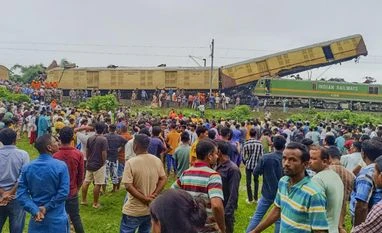Streamlined SOP around automatic signal failure, says railway board
Committee under RDSO prepping action plan to reduce signal failures
)
Kolkata:Locals gather after a collision between the Kanchanjungha Express and a goods train, near Rangapani railway station, on Monday, June 17, 2024. At least 15 people were killed and 60 others suffered injuries, according to officials. (Photo:PTI)
Listen to This Article
In the aftermath of multiple accidents occurring due to automatic signalling failures, the Ministry of Railways has standardised the operating procedure for train crew in case of such failures, the railway board announced today.
In June, the accident involving the Sealdah-bound Kanchenjunga Express and a goods train occurred due to the misinterpretation of an “authority to pass” memo by the loco pilot of the express train, according to the railways.
“The authority form has been changed so that there is no possibility of misinterpretation. The training of loco pilots/assistant loco pilots has been further strengthened. Authority forms of different zones have been standardised so that loco pilots across the country see the same form. To increase the reliability of signalling equipment, an action plan is being prepared with the zones under the chairmanship of RDSO,”
Business Standard reported two weeks ago that the railways had formed a committee to revise its Standard Operating Procedure in case of failure of automatic signalling.
“Due to lightning, some circuits and fuses of the relay hut between Rangapani and Chatterhat were shorted, and because of this, the signals turned red. In such situations, some paper authorities are given by the station staff to the loco pilots and guards across the country. The same was given in this case also,” the statement by the railway board said.
Also Read
“This protocol is the same across the country, and this same protocol was followed in this case as well. Unfortunately, the loco pilot of the goods train did not interpret the authority properly. However, the loco pilot of the Kanchenjunga train had interpreted it correctly and had stopped at the red signal,” it added.
There currently is no clarity on whether the Commissioner of Railway Safety (CRS) investigation into the accident has been completed or if the report has been submitted.
The ministry had set up a committee comprising senior officials from departments concerning train operations in the railway board, who reviewed subsidiary rules and regulations regarding protocols for station masters and train crew, such as loco pilots and guards.
So far, rules regarding the protocol in case of failure of the automatic signalling system are considered subsidiary rules, which means that the rules are applicable to the zonal railway, and a certain level of discretion is allowed.
According to the railways, the change in form and rules will eliminate the scope for discretion and misinterpretation of instructions.
In cases of automatic signal failure, the protocol for loco pilots in automatic territory is to stop at the red signal for 1 minute during the day and two minutes at night, and drive at a speed of 15 kmph.
More From This Section
Topics : Railways Train Accident Railway Board
Don't miss the most important news and views of the day. Get them on our Telegram channel
First Published: Jul 16 2024 | 7:58 PM IST